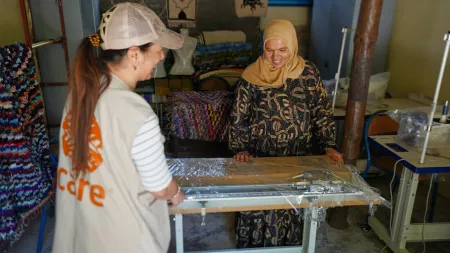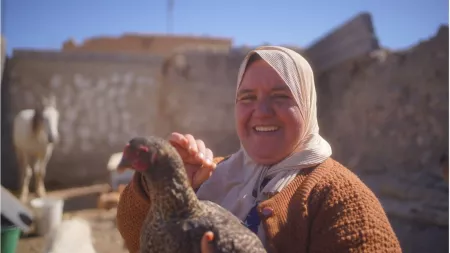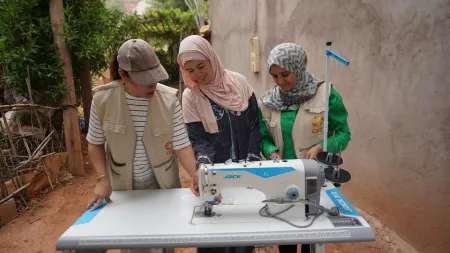Just before midnight on September 8 last year, a devastating earthquake struck Morocco’s Al-Haouz province killing an estimated 30,000 people and leaving about 380,000 people without a roof over their heads.
Over 59,000 homes and at least 530 schools were damaged or destroyed.
The 6.8 magnitude earthquake was the most powerful recorded in Morocco in over a century and the deadliest since 1960, leaving a trail of destruction in about 95 towns and villages in the High Atlas mountain range of Al-Haouz province, about 72 kilometers from the city of Marrakech.
We have prioritized supporting economic recovery, reconstruction and rehabilitation efforts in some of the most heavily affected villages, providing dignified shelters, pre-fabricated safe women spaces and schools that enable people to regain some sort of normalcy.”Hlima Razkaoui, CARE Maroc Country Director
“One year after the earthquake, despite the authorities’ swift response and reconstruction efforts undertaken, many families, more specifically those in the remotest hard-to-access mountainous areas, have lost everything and are still living in tents offered by government and civil society partners,” said Hlima Razkaoui, CARE Maroc Country Director. “Therefore, we have prioritized supporting economic recovery, reconstruction and rehabilitation efforts in some of the most heavily-affected villages, providing dignified shelters, pre-fabricated safe women spaces and schools that enable people to regain some sort of normalcy.”

CARE Maroc and its local partners were among the first organizations to respond, distributing tents, food baskets and dignity kits to communities impacted by the earthquake in 21 villages. CARE’s pre-earthquake programs in rural localities in the region mainly engaging women and female-headed households in economic empowerment activities enabled a quick emergency response.
CARE Maroc has helped build 10 prefabricated preschools, as well as safe spaces for women and children in partnership with local organizations. In June, CARE Maroc delivered and installed 60 solar panels to 3 cooperatives, Tigdelt d’olives, Tiwizi, and Zawia.
CARE Maroc has also distributed shelter items like tents, blankets and mattresses to more than 5,000 people, and supported economic recovery by continuing to offer assistance to village savings and loans associations as well as 25 village cooperatives. CARE is currently organizing cash and voucher assistance expected to more than 3,000 vulnerable households.

“Thanks to the quick basic needs delivery and psychological support provided by CARE, I developed resilience and strength making me ready and strong to restart my business,” said Zahra, a mother of three who lost her business due to the earthquake.
Before the earthquake, Zahra participated in the Al-Izdihar (prosperity) savings group and had signed up for literacy classes with CARE in the hope of generating more income to better support her family as the head of her household and main breadwinner. When the earthquake struck, Zahra turned to CARE to receive desperately needed relief items, including food, hygiene kits, and a tent.
“The sturdy tent we received helped alleviate our fear and anxiety of sleeping outdoors as the winter was approaching,” said Zahra.
“My mother’s strength gives us hope for the future.”Khadija, Zahra’s daughter.
Today, with support from CARE, Zahra has been able to revive her poultry farming business in the backyard of her destroyed home. With some income she had put aside, she was able to help her daughter learn sewing and rebuild her dreams for the future.
“My mother’s strength gives us hope for the future,” said Khadija, Zahra’s daughter.
For media inquiries, please contact: [email protected].
